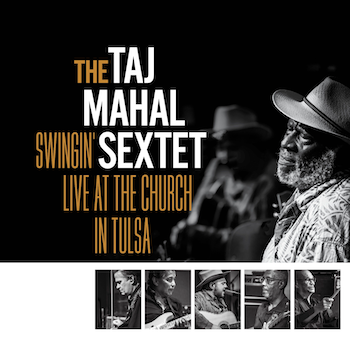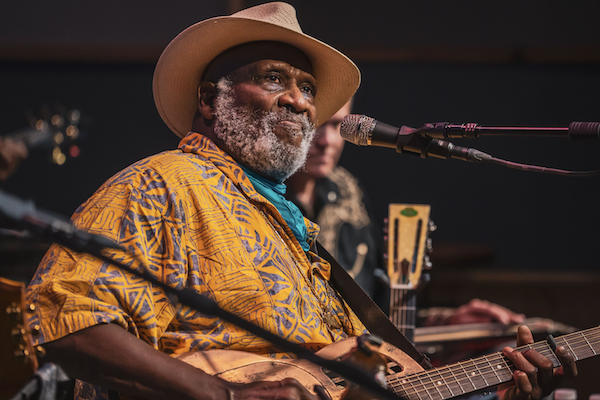Folk Album Review: “Swingin’ Live at the Church in Tulsa” — Taj Mahal Ascendant
By Scott McLennan
Swingin’ Live at the Church in Tulsa is a snapshot of a vibrant octogenarian artist who is still moving forward.
Swingin’ Live at the Church in Tulsa, The Taj Mahal Sextet (Shelter Records)

On Swingin’ Live at the Church in Tulsa, Taj Mahal picks through his vast catalog to reexamine a handful of gems and uses his ever-deepening mastery of American roots music to put a new shine on songs that in some cases he has been playing since the start of his career in the ’60s.
Mahal, who grew up in Springfield, Massachusetts, and turns 82 in May, is his usual lively self on this new concert recording made in the Oklahoma studio that served as the one-time base for Leon Russell. But Mahal is also appropriately reverent in the church, at least in terms of paying due respect to the power and poetry of American blues.
For this session, cut live in front of an audience, Mahal created a sextet by adding two premier pickers — acoustic guitar player Trey Hensley and dobro player Rob Ickes — to his usual quartet lineup of guitarist Bobby Ingano, drummer Kester Smith, and bassist Bill Rich. Mahal himself is a considerable force on various guitars as well as on the ukulele, banjo, and piano. Oh yes, and then there’s that voice, full of grit and wisdom acquired over the decades but still prone to spurts of mischief and dips into tenderness.
The album opens with “Betty and Dupree,” a folk legend told by countless artists in myriad variations about how the love Dupree had for Betty led him to rob a jewelry store in hopes of scoring her a diamond ring. When you listen to old versions of the song, Dupree is nabbed for killing a store guard and spends the rest of his life in jail. Mahal sings this song on other albums of his; he favors Chuck Willis’s 1958 stride blues adaptation, which focuses more on the sweet but haunted love shared between Betty and Dupree. In the Church, Mahal updates his more sympathetic interpretation of Betty and Dupree, adding a verse about a ball Betty threw for Dupree at which the guests were zombies and ghosts. He also leaves room for listeners to speculate whether Dupree is really just dreaming the whole thing from his bed in the Sing Sing prison.
For as long as Mahal has been playing the blues, he has treated the form as dynamic. Few artists bend, fold, and combine genres as seamlessly as this musician does, and the band heard on this record is as good as it gets when it comes to following the lead of Mahal, who unapologetically adds country music, Hawaiian music, reggae, and jazz to his blues. He typically ends up with something that is equal parts traditional and progressive.

Taj Mahal in performance. Photo: Phil Clarkin
Hensley and Ickes are wonderful additions to Mahal’s band. Their respective guitar and dobro work beautifully enhances Mahal’s sprawling, enveloping sound; they sometimes shine via featured solos; other times they blend in with the ensemble work. Most valuably, they are crucial to recasting old faves such as “Queen Bee” and “Sitting on Top of the World.” Hensley’s vocal duet with Mahal on the popular “Lovin’ in My Baby’s Eyes” turns that track into another of the record’s standouts. And while you may think we do not need yet another version of Mahal staples “Corrina” or “Mailbox Blues,” the sextet plays them with the same excited sense of exploration that they do everything else in this hour-long performance.
The album’s two instrumentals — “Waiting for My Papa to Come Home” and “Twilight in Hawaii” — showcase the intricacy of the night’s musicianship. The musical lines are spun like fine lace, a sharp contrast to the screaming solos and muscular jams that (all too often) are the default position when performing the blues.
Still, blues purists will be rewarded with the mesmerizing turns of “Slow Drag” and the aching howl of “Mean Old World,” the latter tune stretched out as it is transformed into a 10-minute epic that has Mahal deploying frolicking riffs on piano before calling on the other players to come in with solos.
Mahal is often lazily referred to as a “treasure” and an “icon” — words that convey that something’s value has already been set, perhaps even maxed out — but Swingin’ Live at the Church in Tulsa is a snapshot of a vibrant octogenarian artist who is still moving forward.
Scott McLennan covered music for the Worcester Telegram & Gazette from 1993 to 2008. He then contributed music reviews and features to the Boston Globe, Providence Journal, Portland Press Herald, and WGBH, as well as to the Arts Fuse. He also operated the NE Metal blog to provide in-depth coverage of the region’s heavy metal scene.
